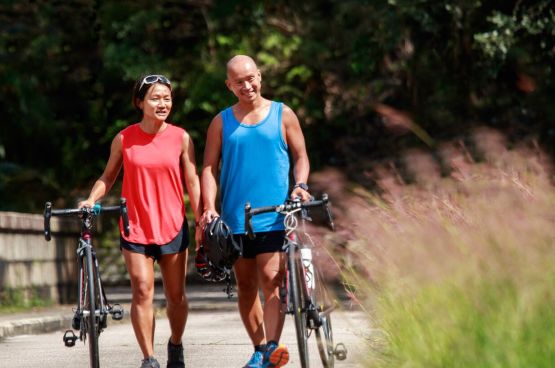The health benefits of walking

What are the benefits of walking?
Walking and spending time in nature can have a huge range of benefits for both your physical and mental wellbeing.
Mental health benefits
Exercise releases feel-good hormones, and studies have shown it can:
- improve your mood
- reduce stress and anxiety
- improve memory and problem-solving
- help you sleep better
- Increase your energy
- help you to cope with difficult times
- improve your confidence and self-esteem
- reduce the risk of depression
Physical health benefits
As well as boosting your mental health and wellbeing, walking can also benefit your physical health. For example, it can help you to:
- maintain a healthy weight
- keep your muscles and bones healthy
- improve your heart and cardiovascular fitness
- maintain good balance
It can also reduce your risk of developing certain health conditions, including:
- cardiovascular diseases such as high blood pressure and stroke
- type 2 diabetes
- sleep disorders such as sleep apnoea
- some cancers such as bladder and breast cancer
How much walking should I do?
In the UK it is recommended that adults get active every day. You should aim to do at least two and a half hours (150 minutes) of moderate intensity physical activity a week. You can break this down into sessions of 10 minutes or more and spread this out across the week. Moderate intensity means:
- your breathing is faster
- your heart rate is faster
- you feel warmer
Walking can count towards moderate-intensity exercise - so long as it’s brisk (about 80 steps per minute).
Walking every day for at least 10 minutes can boost your physical fitness and the more days you can do this, the better. Although, a recent study suggests that walking 8000 brisk steps for one to two days a week is enough to gain some of the health benefits of walking.
How can I get started with walking for exercise?
The good news is you don’t have to climb mountains to feel the benefits of walking. You can start slowly and gradually increase how much you’re doing each week. Think about your daily routine and where you can include some walking. You could try:
- taking a walk before work – especially if you’re working from home
- walking to work, the train station, or bus stop if you need to travel to your place of work
- using your lunch break to go for a stroll
- going to the shops on foot rather than taking the car
- walking with another person or group of people to keep you motivated to go for a walk
- listening to music, podcasts, or audiobooks while you walk
- setting yourself a daily step goal and tracking your steps using a fitness tracker, app, or pedometer
- using a walking app to help you discover new routes in your local area
What ways can you step up your walking routine?
Have you started a regular walking routine and want to make it more interesting? Why not try some different ways of walking to help keep you engaged with exercise and boost your cardiovascular fitness? Here are some ideas you could try on your next walk.
- Pace counts. Monitor your walking pace and set pace-related goals to track your progress and keep you motivated. You can do this by using a walking app.
- An interval-training walk. You could try doing short periods of walking at a faster pace. For example, try adding 15-30 second intervals of speed walking to your normal walk, giving yourself as much recovery time as you need.
- Walking poles. You can use walking poles to help with balance and engage your arms and upper body during your walk.
- Meditative walking. Try to be present during your walk by paying attention to your surroundings. You could also practice breathing exercises to help manage stress. For example, match your footsteps with your breathing patterns - take four steps as you inhale and four steps as you exhale.
Make sure to wear a comfortable pair of shoes or trainers that provide adequate support. It’s also important to wear weather-appropriate clothing and keep hydrated. You can start small and find a rhythm that works for you – any exercise is better than none.
Are you interested in learning more about your health? Discover more about our range of health assessments.
-
Sources Sources
- Physical activity and your mental health. Mind. www.mind.org.uk, published March 2019
- UK Chief Medical Officers’ Physical Activity Guidelines. Department of Health and Social care. www.gov.uk, published September 2019
- Physical activity: walking and cycling. National Institute for Health and Care Excellence (NICE). www.nice.org.uk, reviewed February 2019
- Diet, Exercise and Sleep. Sleep Foundation. www.sleepfoundation.org, reviewed March 2023
- Physical activity. World Health Organisation. www.who.int, reviewed October 2022
- Get active outdoors: Walking. Sport England. www.sportengland.org , accessed 11th December 2023
- 10 minutes brisk walking each day in mid-life for health benefits and towards achieving physical activity recommendations. Public Health England. www.gov.uk , Published August 2017
- Inoue K, Tsugawa Y, Mayeda E et al. Association of Daily Step Patterns with Mortality in US Adults. JAMA Netw Open 2023;6:e235. doi:10.1001/jamanetworkopen.2023.5174
- Lalande S, Okazaki K, Yamazaki T et al. Effects of Interval Walking on Physical Fitness in Middle-Aged Individuals. J Prim Care Community Health 2010;1:104-110. doi:10.1177/2150131910363598
- Clark D, Schumann F and Mostofsky SH. Mindful movement and skilled attention. Front Hum Neurosci 2015;9:297. doi:10.3389/fnhum.2015.00297
- Lengacher C, Reich R, Ramesar S et al. Feasibility of the mobile mindfulness-based stress reduction for breast cancer (mMBSR(BC)) program for symptom improvement among breast cancer survivors. Psychooncology 2018; 27:524-531. doi: 10.1002/pon.4491
- Tschentscher M, Niederseer D, Niebauer J et al. Health benefits of Nordic walking: A systematic review. Am J Prev Med 2013;44:76-84. doi.org/10.1016/j.amepre.2012.09.043
About our health information
At Bupa we produce a wealth of free health information for you and your family. This is because we believe that trustworthy information is essential in helping you make better decisions about your health and wellbeing.
Our information has been awarded the PIF TICK for trustworthy health information. It also follows the principles of the The Information Standard.

More exercise and fitness articles
Did you find our advice helpful?
We’d love to hear what you think. Our short survey takes just a few minutes to complete and helps us to keep improving our healthy lifestyle articles.
Legal disclaimer
This information was published by Bupa's Health Content Team and is based on reputable sources of medical evidence. It has been reviewed by appropriate medical or clinical professionals and deemed accurate on the date of review. Photos are only for illustrative purposes and do not reflect every presentation of a condition.
Any information about a treatment or procedure is generic, and does not necessarily describe that treatment or procedure as delivered by Bupa or its associated providers.
The information contained on this page and in any third party websites referred to on this page is not intended nor implied to be a substitute for professional medical advice nor is it intended to be for medical diagnosis or treatment. Third party websites are not owned or controlled by Bupa and any individual may be able to access and post messages on them. Bupa is not responsible for the content or availability of these third party websites. We do not accept advertising on this page.







